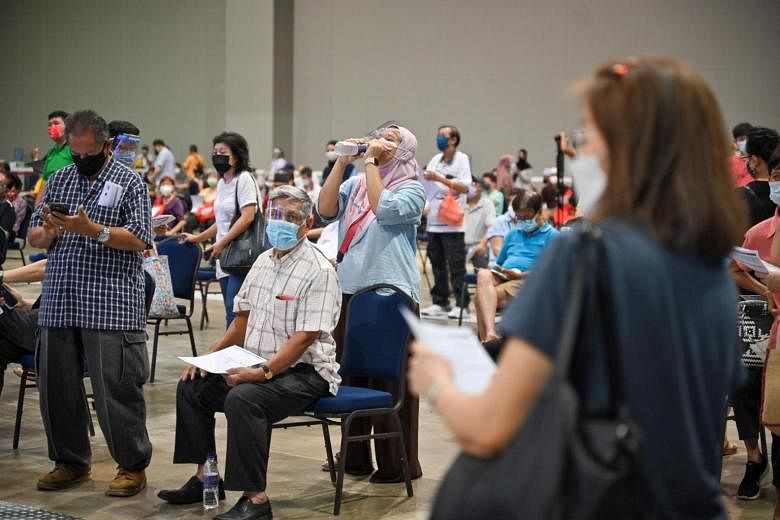PETALING JAYA (THE STAR/ASIA NEWS NETWORK) - Malaysia has ordered enough vaccines to cover 109 per cent of its population who qualify for inoculation, with the aim of achieving herd immunity against Covid-19 by December, said Health Minister Adham Baba.
With steady and fast deliveries of all three approved vaccines - from Pfizer-BioNTech, Sinovac and AstraZeneca - starting this month, the nation would be able to inoculate 80 per cent of its population by December, he added on Thursday (June 3).
Dr Adham said that Malaysia's vaccine supply is expected to increase, with more deliveries in this month and the next. The government has therefore made preparations to speed up the National Covid-19 Immunisation Programme.
Among the measures being taken are the addition of more vaccine dispensing centres (PPVs) nationwide and the introduction of new types of PPV, such as mega centres, drive-throughs and mobile vaccination units.
These different types of PPV will either be overseen by the Health Ministry, the Science, Technology and Innovation Ministry, private healthcare facilities, or bodies like the Covid-19 Immunisation Task Force (CITF).
In a boost to the vaccine stocks, Malaysian health authorities said on Friday conditional approval had been granted for AstraZeneca's vaccine manufactured by Siam Bioscience in Thailand.
Health Ministry director-general, Dr Noor Hisham Abdullah, said in a statement the vaccine supply received from Thailand will speed up implementation of Malaysia's national vaccination programme.
Dr Adham said: "Since the programme started this year, 3.2 million doses have been dispensed. We are currently in the second phase of the national vaccination programme... vaccinating the elderly and those with comorbidities, with phase three expected to start at the end of June, involving those who registered in January, February and March.
"Our main issue now is the human resource capacity to oversee the vaccination programme flow at each PPV in the country, from the registration process to observation after receiving vaccination to crowd control. When all of that is in place, we will be able to ramp up our vaccine drive and, with the continuous supply of all three vaccines, we will be able to reach our target.
"We have ordered enough vaccines for 109 per cent of the population who are eligible for vaccination as a standby. This was done after calculating the number of people above 18 years old and those suitable to receive the vaccination. If we can get the vaccines delivered before December, we can achieve herd immunity."
On criticism that private general practitioners (GPs) are being held back by red tape from participating in the national vaccination programme, such as by having to undergo training, Dr Adham, himself a GP, said that this is necessary.
According to reports, only 2,467 GPs have signed up to join the programme, of which 1,665 have undergone the training.
Dr Adham said the government very much needed the help of GPs to make the vaccination programme a success, but added that they must still be trained to understand the flow chart of the programme.
He said: "We just want to train them on the flowchart and ensure the programme runs smoothly, as there are many aspects to consider, such as clinical errors, risks and legal matters.
"For example, we have to teach them the guidelines on how to store vaccines such as the one by Pfizer-BioNTech, which needs to be kept extremely cold, and what to do with spoilt vaccines, as well as procedures such as the observation period after vaccination and who to call in case of an emergency.
"I do need their help but they also must be briefed on the flowchart so we can minimise such issues."











